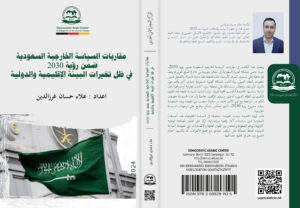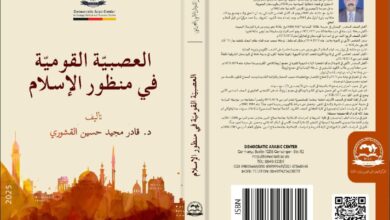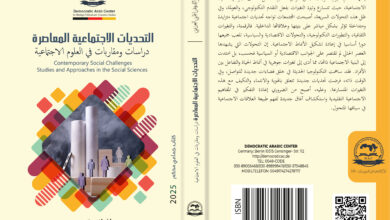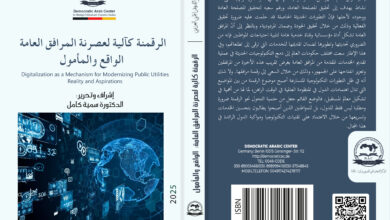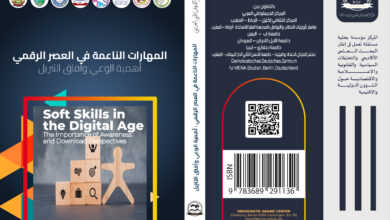مقاربات السياسة الخارجية السعودية ضمن رؤية 2030 في ظل تغيرات البيئة الإقليمية والدولية
Saudi Foreign Policy Approaches within Vision 2030 In Light of the Changes in the Regional and International Environment
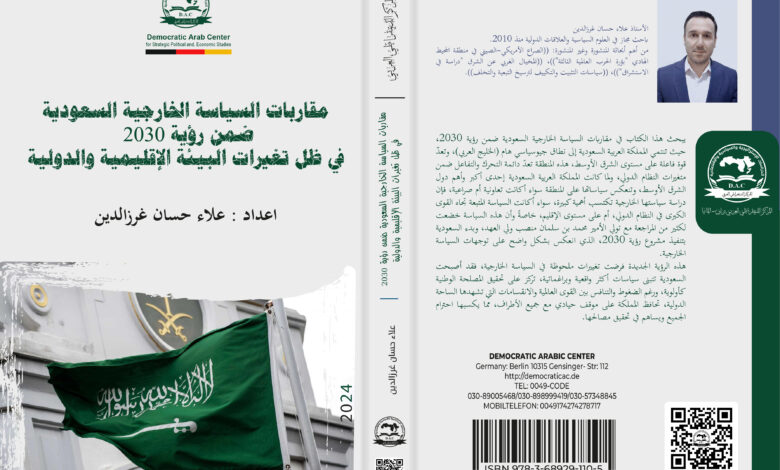
تأليف : علاء حسان غرزالدين – باحث مجاز في العلوم السياسية والعلاقات الدولية – سوريا
نسخة “pdf”-
مقاربات السياسة الخارجية السعودية ضمن رؤية 2030 في ظل تغيرات البيئة الإقليمية والدولية
الطبعة الأولى “2024″ –من كتاب :-
مقاربات السياسة الخارجية السعودية ضمن رؤية 2030 في ظل تغيرات البيئة الإقليمية والدولية
جميع حقوق الطبع محفوظة #المركز_الديمقراطي_العربي ولا يسمح بإعادة إصدار هذا الكتاب أو اي جزء منه أو تخزينه في نطاق إستعادة المعلومات أو نقله بأي شكل من الأشكال، دون إذن مسبق خطي من الناشر .
تقديم : –
تنتمي المملكة العربية السعودية جغرافياً وثقافياً إلى نطاق جيوسياسي هام يتمثل بالخليج العربي، كما تعدّ قوة فاعلة على مستوى الشرق الأوسط، هذه المنطقة التي تعدّ دائمة التحرك والتفاعل مع متغيرات النظام الدولي، ولما كانت المملكة العربية السعودية إحدى أكبر وأهم دول الشرق الأوسط، والسياسات التي تتبعها تنعكس على تفاعلات المنطقة سواء أكانت تعاونية أم صراعية، فإن دراسة سياستها الخارجية تكتسب أهمية كبيرة، سواء أكانت السياسة المتبعة تجاه القوى الكبرى في النظام الدولي، أم على مستوى الإقليم، خاصةً وأن هذه السياسة خضعت لكثير من المراجعة مع تولي الأمير محمد بن سلمان منصب ولي العهد، وبدء السعودية بتنفيذ مشروع رؤية 2030، الذي انعكس بشكل واضح على توجهات السياسة الخارجية.
هذه الرؤية الجديدة فرضت تغييرات ملحوظة في السياسة الخارجية، فقد أصبحت السعودية تتبنى سياسات أكثر واقعية وبراغماتية، تركز على تحقيق المصلحة الوطنية كأولوية، ورغم الضغوط والتنافس بين القوى العالمية والانقسامات التي تشهدها الساحة الدولية، تحافظ المملكة على موقف حيادي مع جميع الأطراف، مما يكسبها احترام الجميع ويساهم في تحقيق مصالحها.
لعل أبرز ما مثّل تأثير مشروع الرؤية في توجّه المملكة إلى تنويع شراكاتها الدولية، هو التوجه شرقاً نحو روسيا والصين، وعدم الاكتفاء بالشراكة مع الولايات المتحدة الأمريكية، أما على مستوى الإقليم فقد تبنت المملكة سياسةً تعاونية، عبر سعيها الحثيث إلى تبريد الأزمات المشتعلة منذ سنوات في المنطقة، بغية تهيئة الظروف الملائمة للتنمية والازدهار الاقتصادي والاجتماعي، ويمكن القول في هذا السياق أن السلوك السعودي يعبر عن النضج الواقعي، الذي يجري عندما تدرك الدول أن أمنها مرتبط بأمن الدول الأخرى، فمع التسليم بوجود نزعة لدى الدول للتركيز على مصالحها الأمنية المحدودة والضيقة، فإنه يسود اعتقاد متزايد بين الدول الأكثر نضوجاً في النظام الدولي بأن هناك أسباباً أمنية وجيهة لأخذ مصالح جيرانها بالاعتبار عند رسم سياساتها الخاصة، وهذا ما دفع بالمملكة إلى تخفيف التصعيد في اليمن، والاتجاه من ثم نحو المصالحة مع القوى البارزة في المنطقة كتركيا وإيران.
تسعى المملكة العربية السعودية إلى اتباع نهج جديد يحقق مصالحها الوطنية من خلال تعزيز دورها الإقليمي عبر استراتيجية “صفر مشاكل” والتعاون مع القوى العالمية الكبرى مثل روسيا والصين والولايات المتحدة، كما تسعى إلى تثبيت موقعها القيادي في المنظمات الدولية والإقليمية والتقارب مع خصومها السياسيين، مثل إيران.
إلى جانب ذلك، تهدف المملكة إلى تنويع اقتصادها الذي يعتمد بشكل كبير على النفط، من خلال تشجيع الاستثمارات ورؤوس الأموال والمشاريع الريادية، وتعزيز جميع القطاعات الإنتاجية، يتجلى هذا الطموح في رؤية 2030 التي تعكس آمال التحول الاقتصادي والاجتماعي في البلاد.
Abstract
The Kingdom of Saudi Arabia belongs geographically and culturally to an important geopolitical area represented by the Arabian Gulf, and is considered an effective force in the Middle East, a region that is constantly moving and interacting with the variables of the international system. Since the Kingdom of Saudi Arabia is one of the largest and most important countries in the Middle East, and the policies it follows are reflected in the interactions of the region, whether cooperative or conflictual, studying its foreign policy is of great importance, whether it is the policy followed towards the major powers in the international system, or at the regional level, especially since this policy has undergone a lot of review with the assumption of Prince Mohammed bin Salman as Crown Prince, and Saudi Arabia began implementing the Vision 2030 project, which was clearly reflected in the directions of foreign policy. This new vision imposed noticeable changes in foreign policy, as Saudi Arabia has begun to adopt more realistic and pragmatic policies, focusing on achieving the national interest as a priority, and despite the pressures and competition between global powers and the divisions witnessed in the international arena, the Kingdom maintains a neutral position with all parties, which earns it the respect of all and contributes to achieving its interests. Perhaps the most prominent thing that represented the impact of the Vision Project in the Kingdom’s orientation towards diversifying its international partnerships is the orientation eastward towards Russia and China, and not being satisfied with the partnership with the United States of America. As for the regional level, the Kingdom adopted a cooperative policy, through its relentless efforts to cool the crises that have been raging for years in the region, in order to create the appropriate conditions for economic and social development and prosperity. In this context, it can be said that Saudi behavior expresses realistic maturity, which occurs when countries realize that their security is linked to the security of other countries. While acknowledging the existence of a tendency among countries to focus on their limited and narrow security interests, there is a growing belief among the more mature countries in the international system that there are valid security reasons for taking the interests of their neighbors into consideration when formulating their own policies. This is what prompted the Kingdom to reduce the escalation in Yemen, and then move towards reconciliation with prominent powers in the region such as Turkey and Iran. Saudi Arabia seeks to adopt a new approach that achieves its national interests by strengthening its regional role through the “zero problems” strategy and cooperation with major global powers such as Russia, China and the United States. It also seeks to consolidate its leadership position in international and regional organizations and rapprochement with its political opponents, such as Iran. In addition, the Kingdom aims to diversify its economy, which is largely dependent on oil, by encouraging investments, capital and entrepreneurial projects, and enhancing all productive sectors. This ambition is evident in Vision 2030, which reflects the hopes of economic and social transformation in the country.
الناشر: المركـز الديمقراطي العربي للدراسات الاستراتيجية والسياسية والاقتصادية – ألمانيا – برلين
Democratic Arabic Center- Berlin – Germany

